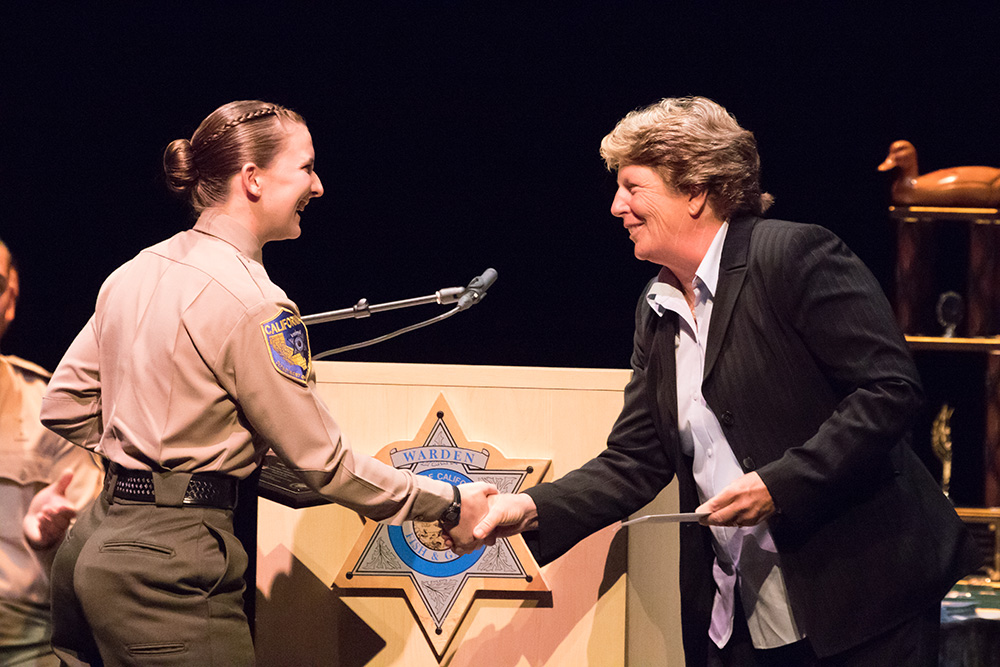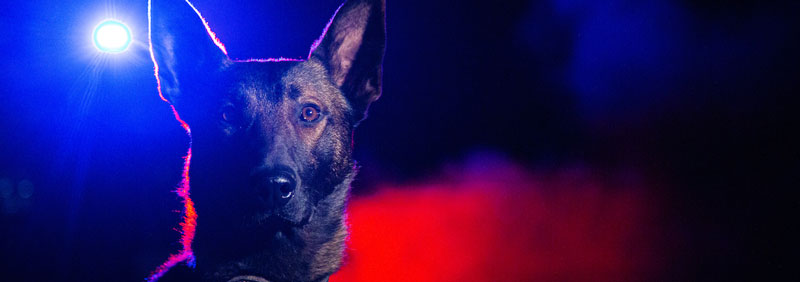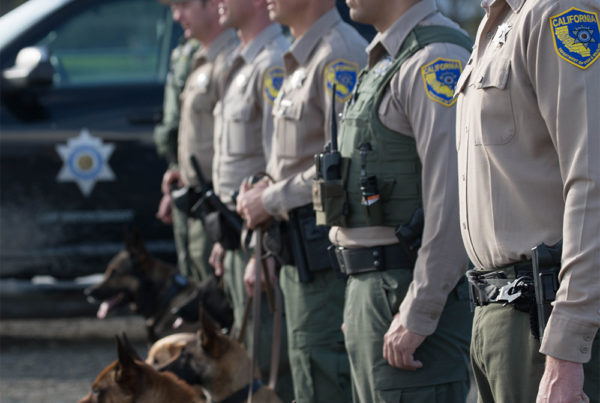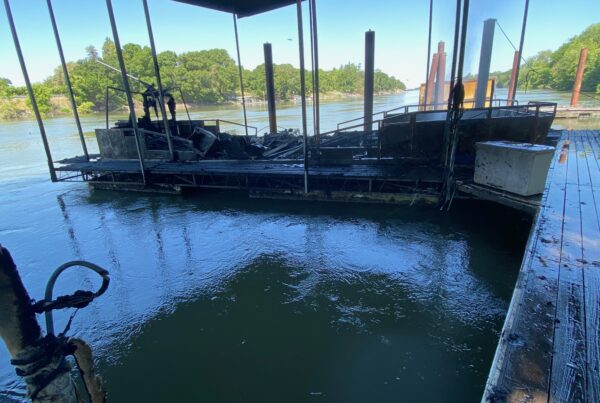Nancy Foley – Retired Chief Fish and Wildlife Officer on what Californians should know about the Thin Green Line and Fish and Wildlife Officers.
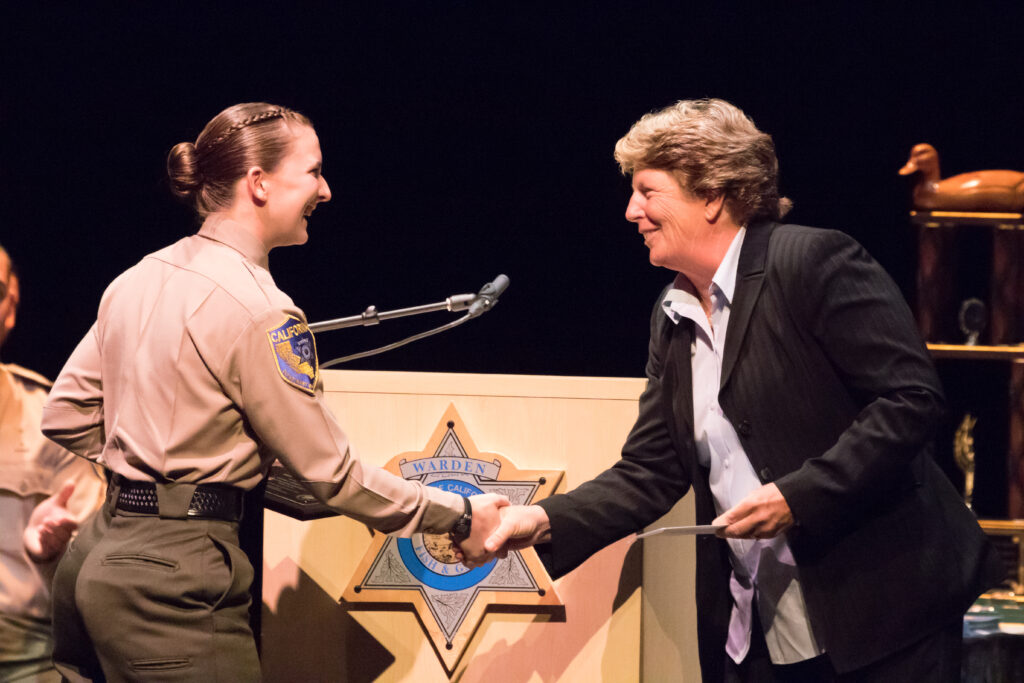
Calwof is working to support the fish and wildlife officers that serve the beautiful state of California. Nancy Foley is a retired Chief that continues to serve on our board of directors at Calwof. She shares her passion for outdoors and how it led to her following that passion to a career of service with the California Department of Fish and Wildlife.
________________________________________________________________________________________________________________________
Tell us a little bit about who you are and what your role is…
Nancy Foley My name is Nancy Foley. I am a longtime conservationist and I really feel much more comfortable being outside than inside, and that’s pretty much how I got to the job, my true passion of being a Fish and Wildlife officer. I grew up in Pennsylvania and I’m the youngest of four. My dad hunted, but he didn’t feel comfortable being out in the woods because there were just so many hunters in Pennsylvania at the time and he thought that four little kids running around out there may not be the safest. So he actually stopped hunting! But I had a lot of uncles that still hunted there (and maybe didn’t always follow the game laws like they should have) So I had always heard the stories and then ended up going to Penn State for my degree and have a Bachelors of Science in Outdoor Recreation and Parks and again, still felt so much more comfortable outside than inside. My first job was with Death Valley National Monument. So you can imagine the change from Pennsylvania to Death Valley National Monument. I remember driving into Death Valley and I had cross-country skis on my car and I could actually see the wax dripping off of my skis as I drove into Death Valley. I couldn’t see anything green. And I thought to myself, “what have I done?” And then I worked for national parks for a while, Rocky Mountain National Park, Olympic National Park, and then left the park service after a climbing accident with a friend of mine. I ended up moving back to California and started working for California state parks, where I worked as an interpreter helping people with walks and talks and working at Anza-Borrego Desert State Park. Finally, I came to my true passion of being a California Game Warden. At the time, we were called game wardens. Now we’re fish and wildlife officers.
Give us a good description of your history with the Department of Fish and Wildlife.
Nancy Foley So it took me a while to get into the Fish & Wildlife. I had applied and it was pretty competitive back in the late 80s. I applied, I was going through the process when I was younger while I was traveling quite a bit. I rode my bicycle across the United States. I lived in many states along the way and during that time I received a note to take the test. I was an unusual candidate for California at the time. Number one, I was female. Number two, I was from Pennsylvania. So the background check that they had to do was a little bit different than they had to in the past. I actually got the notification that I didn’t pass the background check, and that my education of a four year degree Bachelor of Science wasn’t sufficient enough. And I thought that was rather odd because they only required 60 units. But then a couple of weeks later, I got another note that said that they had made a mistake. I got hired and was part of what we call the Test Academy for Fish and Wildlife. It was the first academy that was specific for California Wildlife Officers. We had a lot of sheriff’s departments and police departments involved with us. It was the first one that we had our own Fish and Wildlife instructors, even for the regular peace officer material. So that’s how I started as a fish wildlife officer, being part of that first academy in Napa, California.
And when was that?
Nancy Foley That was in 1987 is when I started in. 1988 is when we graduated April 8th at 12 o’clock. It was a date that will be forever tattooed in my brain. It was a great day. There were four, or five of us that graduated from that along with 30 other sheriff’s departments and police department officers. So that’s a pretty great day.
What’s the most memorable day that you could say that you had on the job?
Nancy Foley I went through the academy, graduated from the academy, and then I had a long history. It was about 25 years that I was actually with Fish and Wildlife. I started in San Diego which was a great spot to start. We had the whole coast, the marine fisheries, we had everything happening at the border. And then we could go inland and we could work ducks and pheasants and deer and mountain lion and right over the hill in the desert and Anza-Borrego, and we could work all the reptile collectors. So it was a really great place to work. I learned an awful lot in a short amount of time in San Diego, and then I transitioned into the other undercover unit called the Special Operations Unit for California Fish Wildlife. At the time we were focused mainly on abalone, the illegal take and sale of abalone. And so we did a lot of surveillance, we had a lot of store fronts, and we made some really remarkable cases and were able to change some of the laws because of the theft that was occurring from the Red Abalone here in California. From there, I transitioned in and out of the undercover unit and into general uniformed patrol in a number of different places, promoted up through the ranks, and each time that I promoted, there was something that I just I felt like I couldn’t accomplish from the position I was in. If you asked me when I was in the academy what my aspiration was, it would probably to have been a California Fish and Wildlife officer forever because that was an amazing job. But as time went on, there were just different things that I wanted to accomplish. And I ended up as the Chief Of The Law Enforcement Division. That’s the position I retired from and it was an amazing career. So the very first time I was in the academy and they yelled at, all of us new people were sitting in there in street clothes and that drill sergeant came in and yelled “Atten-Hut!” And we were looking at each other like attention? Like what? And so that was the beginning of my paramilitary experience with fish and wildlife, that will always be in my mind. My first big solo case was a commercial trap bribing, where sport fishers would go out and rob commercial traps for lobster in San Diego, that was when I felt like, “OK, like I’m a game warden now, I can do this” to my first undercover case where, a lot of the people in the unit were away and they didn’t really think that women were going to be able to do the job. I went in with us for some salmon poachers that were selling salmon. Of the three main people running the operation, one had a conviction for rape, one had a conviction for murder, and one had a conviction for forgery and the very first day they they fell all over themselves trying to sell fish just so that one was a memorable one. And then the final one was my last day of work. It was amazing. It was a graduation for an academy class so I could sit there and swear them in to be the next generation of California Wildlife Officers. And as the ceremony closed, I walked out the door and that was the end of my career. I had so many memorable moments, but I guess those were the highlights.
What do you wish that the general public knew about the men and women of the thin green line?
Nancy Foley I wish they knew how dedicated they are — Dedicated. Passionate. Skillful. They really can do anything. They don’t just drive trucks and make contacts. They don’t just go out and check hunters and anglers. They do so much more than that. They’re really the experts off the pavement. They know how to sneak through the woods. And yet at the same breath, we have plenty of wildlife officers that are in big cities. The diversity of the job and how much the job that they do supports the people and the wildlife in the state of California. It’s been our biggest hurdle, really is trying to get people to understand what wildlife officers do and the benefit that they are to this state. We have some great, amazing officers and they’re so dedicated and passionate about conservation and protecting the people of the state of California. That’s what I wish they would know.
To follow up on that, why do you think that is? Why do you think that that confusion exists?
Nancy Foley That’s a really good question. We are the oldest uniform law enforcement in the state of California that started the history of California game warden at the time in 1871. And at the time, most of the people in California either hunted or fished. I think it was about the 1940s where we really lost that connection with the people, the population started growing. Not as many people relied on hunting and fishing. Wildlife officers in general do something called “run silent and deep.” They don’t tell their stories of what great work they do, what’s happening to the resources, what they’re seeing out there. We just lost contact. Certainly a lot of that is our own fault. We really haven’t been able to get that connection back with the people of the state. Now, we have 40 million people in the state of California… We have 450 officers? The chances of them ever running into each other are pretty limited, and I don’t think that people make the connection between the clean water that they’re drinking, the natural resources that they have available to them, and the work that the California wildlife officer does. And it’s a story we’ve been trying to tell since 1871, we just haven’t done a very good job of it. When we had a television show on one of the networks about California Wildlife Officers, it really boosted knowledge of our community, both the consumptive and non consumptive, about what wildlife officers did and even Northwoods Law that’s running now and the Texas Game Warden show, Lone Star Law. They’re all helping to tell people, but we still struggle with that. And you know what? The people are very passionate about wildlife and animals. And we just need to convert that passion into support in the legislature and the budgets and things like that. Covid really brought a lot of people to the outdoors and we need to continue to make that connection with everybody and show them what wildlife officers do.
What would you say were the biggest challenges when you were at the department vs today?
Nancy Foley I think some of the challenges remain the same. You have a population of 40 million people and you have 450 officers. It’s a huge job. You 164,000 square miles of land in the state of California, 1100 miles of coastline there, 2800 lakes and thousands of streams. And you have 450 officers. So the challenge is trying to put your officers in the best place to do the job to protect the resource. When I was in there, probably the biggest destroyer of habitat and one of the biggest challenges to conservation at the time was the illegal growth of marijuana, and no matter what you feel about marijuana, it wasn’t about marijuana. It was about the destruction that was happening to our natural habitat. For every acre that they took in public land, it actually affected 10 acres of habitat. We found all of the illegal pesticides that were DDT, just about everything that you could imagine that still was or is illegal in the state as a herbicide or pesticide we found in these groves. We made that shift into more of the marijuana enforcement on public lands, public and private lands because of the destruction of the habitats that they were involved with. When they shoot black bears in the gut just so that they run off and die somewhere outside of the grow, all kinds of destruction… it was really devastating. It’s something that people can’t even comprehend as to what was happening to our wildlife because of the illegal grows. There’s this whole wide range of things that we need to educate the public on just so that they can become aware. The DDT and the pesticides go right into the water courses, and that’s the drinking water that people end up drinking. Wildlife officers are really responsible for a lot of the clean water that we have here in the state of California. That is a big educational challenge.
Transitioning into today as a board member of the California Wildlife Officer Foundation, what are you most proud of that the organization does?
Nancy Foley I am so proud to be here. To be able to help the officers and their families, it’s just such an amazing feeling. Wildlife officers, like I said before, they pretty much run silent and deep. And when the foundation was started, most of the officers didn’t even believe that the foundation was going to be able to help them. Since that time, we’ve been able to give back to the wildlife officers over a million dollars and put it through scholarships, through support of teamwork, things for some specialized equipment for canines. Even though we’re at 12 years old, 13 years old, wildlife officers are just now really believing that there’s this group of people that aren’t wildlife officers that care so much about them. We’ve had a couple of officers that have come down with some pretty serious medical issues. We’ve been able to help them and their families. The canine programs are always a lot of fun to help the canines really assist the wildlife officers and make them safer. I’m proud of everything that we have done for the California Wildlife Officers Foundation. The founding board members were amazing. They were able to generate enough money for us to really be able to assist wildlife officers. And now the new board members, which some are second generation from the first board members. They still have that passion. We’re very, very fortunate and I’m proud of what we’ve been able to do.
Are there any recent current or future initiatives that you are working on that you’d love for people to know more about?
Nancy Foley We’re always working on something. The canine program is something that we always really enjoy supporting. Currently, we have a number of wildlife officers that are evacuated from their own homes because of the fires. We are trying to provide some support to them. Whenever that happens, it costs money. Your power has been cut off at your house. So that means everything in your freezer, your refrigerator, is gone by the time you’re back in. If you’re staying in a hotel, there’s food meal expenses, a lot of people have, animals have to put up somewhere. So right now we’re trying to support the officers that are evacuated. They continue to work the fire, so we’re trying to support their families. And then we’re also in this scholarship mode. So we have 20 officers, their children or spouse have put in for educational or vocational scholarships. At the end of the month, we’ll be giving out some scholarship awards to those families.
Is there anything else that you’d like to talk about?
Nancy Foley I’m very passionate about conservation and conservation law enforcement. I’ve stayed in it past retirement. I think if I’m 90, if I live to the age of 90 and somebody cuts me, I’m going to be bleeding green because I believe in the thin green line, which is conservation law enforcement. I not only believe it in the United States, but across the world. It’s a huge fight and we really need to do a better job for future generations. I’m proud to be in the position, I think Calwof is an amazing foundation that was created for the right reasons. I hope to see more of these foundations pop up across the nation.

